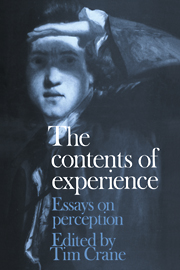Book contents
- Frontmatter
- Contents
- Preface
- Notes on contributors
- 1 Introduction
- 2 The puzzle of experience
- 3 How to interpret ‘direct perception’
- 4 Experience and its objects
- 5 Scenarios, concepts and perception
- 6 The nonconceptual content of experience
- 7 Visual qualia and visual content
- 8 The projective theory of sensory content
- 9 Sight and touch
- 10 The diversity and unity of action and perception
- References
- Index
1 - Introduction
Published online by Cambridge University Press: 22 September 2009
- Frontmatter
- Contents
- Preface
- Notes on contributors
- 1 Introduction
- 2 The puzzle of experience
- 3 How to interpret ‘direct perception’
- 4 Experience and its objects
- 5 Scenarios, concepts and perception
- 6 The nonconceptual content of experience
- 7 Visual qualia and visual content
- 8 The projective theory of sensory content
- 9 Sight and touch
- 10 The diversity and unity of action and perception
- References
- Index
Summary
The problems of perception
Anyone who studies the philosophy of perception will soon realise that there is not just one problem of perception. One reason for this is the bearing theories of perception have on other areas of philosophy. The obvious example here is the role of theories of perception in traditional epistemology – traditional accounts of the foundations of knowledge often depend upon particular conceptions of perception. And theories of perception also have an impact on general philosophy of mind, philosophy of science and aesthetics. As Strawson observed, philosophers' views on perception can often be the key to the rest of their metaphysics (Strawson 1979).
But perception is a subject of interest in its own right. Any full understanding of the mind must give a central place to perception, since it is through perception that the world meets our minds. But the nature of perceptual states is perplexing: do they give us access to the world that is in any sense ‘direct’? Or is perception mediated by the awareness of some mental or nonmental intermediary? Are perceptions essentially conscious? Do they essentially involve sensation? Do they represent the world – do they have content – in the way beliefs or judgements do, and if so, can they be reduced to beliefs? In any case, how do they get their contents? And how do perceptions and their contents relate to the structure of the rest of the mind, especially to belief, desire and action?
- Type
- Chapter
- Information
- The Contents of ExperienceEssays on Perception, pp. 1 - 17Publisher: Cambridge University PressPrint publication year: 1992
- 4
- Cited by



